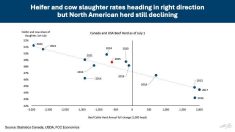Canadian millers are not importing Russian wheat, but it’s possible Russian wheat is an ingredient in some manufactured foods imported by Canada.
That’s according to Canadian grain industry officials, reacting to a recent Globe and Mail story.
“I wouldn’t be surprised if some of the bread we buy in Canada contains Russian wheat,” Sylvain Charlebois, director of Dalhousie University’s Agri-Food Analytics Lab, was quoted as saying in the March 27 article.
If so, the bread wasn’t made with flour produced in Canada.
“To the best of our knowledge, no Canadian grain establishment has sourced milling-quality wheat from outside of Canada in recent years with the possible exception of the United States for specific grades and end-use requirements,” Canadian National Millers Association president Gordon Harrison said in an interview March 29.

“Canada’s variety evaluation, registration and classification system is world class as is the quality of milling wheat producers deliver into the system, leaving no incentive to be sourcing wheat from outside of Canada.”
Why it matters: Canada is among the world’s top wheat exporters. Domestic wheat millers are loyal to Canadian wheat because of its consistent high quality.
In an interview with the Manitoba Co-operator March 29 Charlebois said he didn’t recall telling the Globe and Mail reporter that bread sold in Canada might contain Russian wheat.
“I don’t believe that we have ever imported Russian wheat into Canada,” he said.
“We don’t really eat imported bread in Canada so we wouldn’t eat Russian bread, but I suspect there would be some Russian wheat that would enter our market as a byproduct.
Read Also

Manitoba sunflower plant gets local owners
Scoular’s sunflower and bird feed plant in Winkler, Man., bought by Orenda Commodity Services Ltd. out of Ste. Agathe.
“The point I was making is that markets are quite internationalized when it comes to ingredients. It’s hard to trace and track anything unless it’s labelled and a lot of it isn’t labelled.”
The Globe story was about Canadian grocers removing Russian products in protest to Russia’s invasion of Ukraine.
So while Canada isn’t and hasn’t been importing Russian wheat, some of that wheat might be used in imported food products such as crackers, Charlebois said March 29.
Bruce Burnett agrees.
“Wheat is contained in a large number of manufactured food products,” Burnett, Glacier FarmMedia’s director of markets and weather, said in an interview March 29. “It’s hard to escape it. The question is, is it material or not, and no it won’t be material in terms of the amount of Russian wheat imported to Canada through these speciality products. It will be de minimis (lacking significance or importance), as they say in the trade here.”
(Glacier FarmMedia also owns the Manitoba Co-operator.)
The possibility of Canadians eating bread made from Russian wheat is akin to carrying coal to Newcastle, especially given most of it is low-protein winter wheat.
“The Russians don’t export the kind of wheat that we would use in our milling industry so it’s a non-starter,” Burnett said.
“Southern Ontario produces more than enough (of that type of wheat) to meet our domestic needs. It doesn’t make sense. In products it makes some sense, but again it will be very, very small amounts. It’s not really a significant amount.”
Some inflow
Even though Canada is usually among the world’s top five wheat exporters and a top exporter of other crops sometimes it’s an importer, Burnett said. It hinges on prices and logistics.
In the early 2000s, Canada imported some feed wheat from Ukraine, Burnett said.
Last year there were reports Ukrainian canola had been purchased for delivery to eastern Canadian crushers in the wake of rising prices and dwindling stocks, while Canada’s canola crop was suffering from drought.
“Two years ago Australia was importing a significant amount of Canadian wheat,” Burnett said, after several years of drought. “From my perspective it’s not a big deal, but sometimes it does happen because logistics plays a much bigger role in some of these things.”
Meanwhile, the world is looking to Canada to help offset expected declines in wheat exports from Ukraine and Russia due to the war. Notwithstanding a bumper this fall, Canadian wheat exports are projected to be below average in the 2022-23 crop year because of low carry-out stocks due to drought-reduced production in 2021.
Agriculture and Agri-Food Canada (AAFC) projects when the current crop year ends July 31 Canada will carry over just 3.8 million tonnes of wheat, including durum, compared to the five-year average of 6.6 million tonnes.
AAFC is forecasting a Canadian wheat crop of 31.2 million tonnes this fall, up about a million tonnes from the five-year average with exports in 2022-23 hitting 21.6 million tonnes. That would be six million more tonnes than the projection for this year’s (2021-22) exports, but down almost five million from 2020-21.
Before its collapse in 1991 the former Soviet Union, which included Russia, was one of Canada’s best wheat customers, some years buying several millions of tonnes.
After communal farms were privatized it wasn’t long before Russian wheat production soared, making Russia a major exporter rather than importer.
In 2020 Russia exported 37.3 million tonnes of wheat making it No. 1, according to the Food and Agricultural Organization.
The United States and Canada ranked second and third at 26.13 million and 26.11 million tonnes.
Ukraine was fifth with 18.1 million tonnes of wheat exports.


















